Recommended reads for the summer months
Summer is full of great things— beaches, friends, and parties— and this is why it is among many people’s favorite seasons, mine included. Plus, summer is also about the only season where our life changes so drastically for students like you and me. In spring, fall, and winter, we are largely doing the same thing every day, but in the summer we suddenly have a freedom that we never really experience outside of these two or three months.
Amidst the great fun, though, summer also brings a distinct blend of nostalgia and wistfulness. It may not always jump to mind when we think “summer,” but it is no less important than the rest because it makes us cherish the precious time we have to do what we want.
Malibu? Surfing? Literally everything about this book?
Come on. Just look at the cover.
Malibu Rising by Taylor Jenkins Reid
Goodreads description: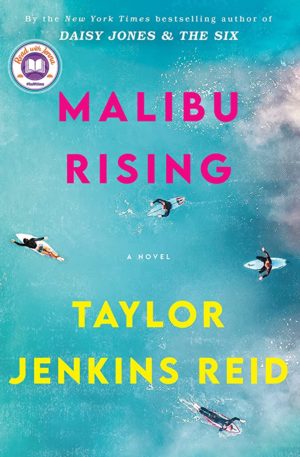
“Four famous siblings throw an epic party to celebrate the end of the summer. But over the course of twenty-four hours, their lives will change forever.
Malibu: August, 1983. It’s the day of Nina Riva’s annual end-of-summer party, and anticipation is at a fever pitch. Everyone wants to be around the famous Rivas: Nina, the talented surfer and supermodel; brothers Jay and Hud, one a championship surfer, the other a renowned photographer; and their adored baby sister, Kit. Together, the siblings are a source of fascination in Malibu and the world over—especially as the offspring of the legendary singer, Mick Riva.
The only person not looking forward to the party of the year is Nina herself, who never wanted to be the center of attention, and who has also just been very publicly abandoned by her pro tennis player husband. Oh, and maybe Hud—because it is long past time to confess something to the brother from whom he’s been inseparable since birth.
Jay, on the other hand, is counting the minutes until nightfall, when the girl he can’t stop thinking about promised she’ll be there.
And Kit has a couple secrets of her own—including a guest she invited without consulting anyone.
By midnight the party will be completely out of control. By morning, the Riva mansion will have gone up in flames. But before that first spark in the early hours before dawn, the alcohol will flow, the music will play, and the loves and secrets that shaped this family’s generations will all come bubbling to the surface.”
If there was any one author who I would want to be at this moment, it’s Taylor Jenkins Reid. Two new films recently released and two more on the way? Sign me up.
Reid’s books are popular for a reason— they’re drama filled but also incredibly genuine and vulnerable. Frankly, even books that I really, really like can sometimes be difficult for me to get through, but I find that Reid is able to create such compelling stories that hook you with the drama and punch you in the gut later. Plus, they make pretty promising adaptations, but I’m here to talk about the books.
What truly makes this book, though, is how it constantly promises to you that there is more coming— that if you just stick around, the truth will be unveiled. It’s a bit like unraveling a mystery, but maybe even more like gossiping with a friend about the insider information on the drama you’ve only heard snippets of.
Even at the very beginning, Malibu Rising sets up so many points of tension and potential conflicts, but you don’t see what leads to it or how they all weave together. To discover it, you have to keep reading. That being said, this method of setting up the story did make me skeptical at the beginning, as the drama felt empty because the characters behind it hadn’t yet been fully explored yet. However, sticking through for just a short while revealed to me that there really was something worthwhile behind it all.
So, if you are a fan of celebrity drama, you can now get the pleasure of speculating over vague details and also get the satisfaction of eventually knowing the whole story.
And I do mean the whole story, because there is so much complexity to the characters, and it is honestly just impressive that the book manages to address all of them and do it well.
Also, I’m a sucker for books about families who have a lot of issues but really do love and want the best for each other, so of course I liked this. What can I say? I’m easy to please.
Time-bending stories
In summer, days blend into weeks and weeks blend into months. That isn’t to say that time seems fake, but it does seem a little more malleable when we don’t have the familiar structure of schooldays and weekends.
Honestly, I don’t personally like time travel in most stories. For this reason, I’ve chosen books that, even if they don’t focus on the mechanics or consequences of time travel play with time in creative ways.
This is How You Lose the Time War by Amal El-Mohtar and Max Gladstone
Goodreads description: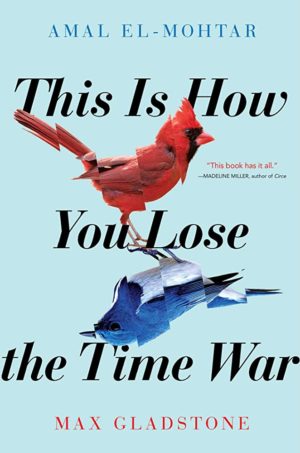
“Among the ashes of a dying world, an agent of the Commandant finds a letter. It reads: Burn before reading. Thus begins an unlikely correspondence between two rival agents hellbent on securing the best possible future for their warring factions. Now, what began as a taunt, a battlefield boast, grows into something more. Something epic. Something romantic. Something that could change the past and the future.
Except the discovery of their bond would mean death for each of them. There’s still a war going on, after all. And someone has to win that war.”
Have you ever finished a book and not remembered anything about it except that you liked it? Yeah, that’s this book. I don’t mean this in a bad way, I just mean that this book is an exercise in the vibes and aesthetic rather than the plot.
For some people, this might be a deal breaker, because although it shares a lot of similar tropes, this book isn’t hard sci-fi. It is like hard sci-fi in the sense that it can be confusing, but for entirely different reasons. There are very few rules in the worldbuilding of this story, and you know very little about either side of the war even at the very end of the book.
But what I do like about this book is that every single line is the kind of beautiful that makes you wish you could read it aloud to savor the way the words sound. It is largely told through the letters they write to each other, which weave incomplete but captivating images of the characters and their lives. If you like purple prose that is more beautiful than it is clear, this might be the book for you. If you are able to suspend your need to figure out a story, this book might be the one for you. If you are just along for the ride, this might be the book for you.
There’s also something so mesmerizing about how the characters in this book are able to manipulate time. It’s deliberate and measured in a way that is refreshing to see in a time-travel story, where protagonists are usually blind as to how exactly their actions will ripple into the future.
So this book might not be a crowd-pleaser with universal appeal, but it is still a worthwhile read to anyone who doesn’t like traditional time-travel stories or who just wants to try something new.
Before the Coffee Gets Cold by Toshikazu Kawaguchi
Goodreads description: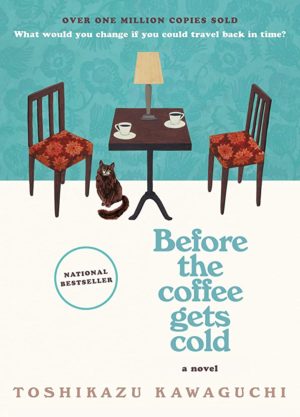
“What would you change if you could go back in time?
In a small back alley in Tokyo, there is a café which has been serving carefully brewed coffee for more than one hundred years. But this coffee shop offers its customers a unique experience: the chance to travel back in time.
In Before the Coffee Gets Cold, we meet four visitors, each of whom is hoping to make use of the café’s time-traveling offer, in order to: confront the man who left them, receive a letter from their husband whose memory has been taken by early onset Alzheimer’s, to see their sister one last time, and to meet the daughter they never got the chance to know.
But the journey into the past does not come without risks: customers must sit in a particular seat, they cannot leave the café, and finally, they must return to the present before the coffee gets cold . . .
Toshikazu Kawaguchi’s beautiful, moving story explores the age-old question: what would you change if you could travel back in time? More importantly, who would you want to meet, maybe for one last time?”
Kawaguchi originally wrote Before the Coffee Gets Cold as a screenplay instead of a novel, and it shows. In fact, those who saw last year’s spring play, Before the Coffee Gets Cold, might find some similarities between the two, so if you were a fan, then this might be a book for you to check out.
That being said, I was not a huge fan of this book. I didn’t dislike it while I was reading, despite some issues that I had, but nothing really stuck with me afterward because none of it was really all that special. What should set this book apart is the unique way that it handles time travel but, unfortunately, that didn’t end up changing how the story played out. Essentially, the intriguing set up of time travel only made a fairly surface-level change to an otherwise predictable story.
But my main issue with the story was that nothing really stuck with me— not the characters, not the plot, and not the writing. Two factors contribute to this, the first being the monotone voice. I can’t say whether this is an effect of the translation or just the nature of being written as a screenplay first, but either way, the narration failed to emphasize certain scenes as more important than others, and therefore it all blended together.
The second is just the actual story itself, which was similarly one-note. Although there were four stories with very different plots, they still all had similar characters, similar tones, and similar resolutions. Because of this, I even had trouble keeping track of the story while I was reading, and I often felt lost.
Having a theme between stories is definitely a common and effective tool in short story collections, but the point of short stories is that you can explore a much greater range of emotions, and not doing so defeats the purpose of writing a collection of short stories. In my opinion, choosing at least one area to switch up between stories helps each one stand out, making them and the story as a whole more memorable.
Reflective Retellings
Being alone with nothing but your thoughts is not usually something we set aside time for in our busy schedules, but in the summer, it becomes kind of inevitable. You do have to run out of TV shows to watch. So when summer rolls around, I tend to spend a lot of time thinking about everything and anything in my life, but even I get tired of thinking about my perfect, amazing self all the time, which makes the following book the perfect read for when you’re in that reflective mood, but you’ve exhausted your own life.
Circe by Madeline Miller
Goodreads description: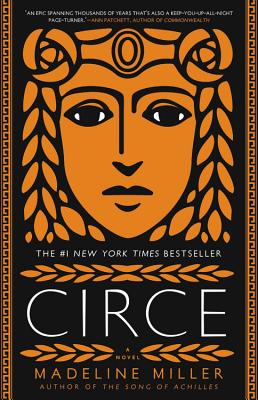
“In the house of Helios, god of the sun and mightiest of the Titans, a daughter is born. But Circe is a strange child–neither powerful like her father nor viciously alluring like her mother. Turning to the world of mortals for companionship, she discovers that she does possess power: the power of witchcraft, which can transform rivals into monsters and menace the gods themselves.
Threatened, Zeus banishes her to a deserted island, where she hones her occult craft, tames wild beasts, and crosses paths with many of the most famous figures in all of mythology, including the Minotaur, Daedalus and his doomed son Icarus, the murderous Medea, and, of course, wily Odysseus.
But there is danger, too, for a woman who stands alone, and Circe unwittingly draws the wrath of both men and gods, ultimately finding herself pitted against one of the most terrifying and vengeful of the Olympians. To protect what she loves most, Circe must summon all her strength and choose, once and for all, whether she belongs with the gods she is born from or with the mortals she has come to love.”
Circe is certainly a popular book, but I do think it is a shame that it is so often overshadowed by Madeline Miller’s other book, because if you love the lush and reflective narration of The Song of Achilles, then Circe will not disappoint, either.
Every turn of a page reveals a line that compels you to write it down for safekeeping. However, what really sets it apart is just how deeply it explores one character.
Unlike most protagonists, who will undergo a distinct character “arc,” Circe does not have such a straightforward path. Hers is more like a character “zigzag” that brings her through countless ups and downs. Over the course of the story, she will oftentimes feel like she has reached some kind of zenith, before realizing that there was still more unfolding in front of her. This will repeat over and over again before coming full circle, making this book, not the story of an event in a character’s life, as most books are, but rather of her life as a whole.
However, this also means that it can be difficult to read because it does not always flow well. Since the book is so dedicated to capturing Circe’s entire life journey, the plot similarly zips and zags. There are times when there is almost no plot, so I do recommend the audiobook if you find that the flow of the book isn’t working for you.
The bigger issue that I had with this book is that there were quite a few times when the story would only pick up due to some outside influence. Granted, I see how it would be difficult to make things happen when your character is confined to an island, but it still doesn’t feel great when new characters keep appearing randomly to request help or to threaten our main character.
Ultimately, the good things about this book outweigh the bad. I still love this book because of how it explores all of the complicated emotions that Circe feels, not just the ones that fit into a neat, linear storyline, like the listlessness that sometimes comes with freedom.
Superheroes/Supervillains
“‘Oh, you’re a villain alright, just not a super one!’
‘Yeah? What’s the difference?’
‘Presentation!’”
— Megamind (2010)
Okay, but in all seriousness, Megamind has a point here. There is something so fun and camp about supervillains and superheroes that makes them really nostalgic.
Renegades by Marissa Meyer
Goodreads description: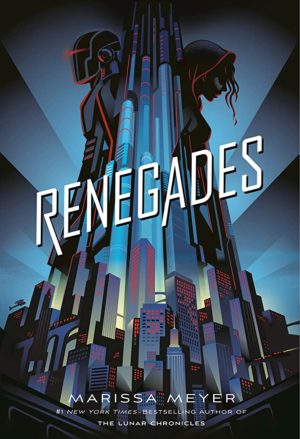
“Secret Identities. Extraordinary Powers. She wants vengeance. He wants justice.
The Renegades are a syndicate of prodigies — humans with extraordinary abilities — who emerged from the ruins of a crumbled society and established peace and order where chaos reigned. As champions of justice, they remain a symbol of hope and courage to everyone… except the villains they once overthrew.
Nova has a reason to hate the Renegades, and she is on a mission for vengeance. As she gets closer to her target, she meets Adrian, a Renegade boy who believes in justice — and in Nova. But Nova’s allegiance is to a villain who has the power to end them both.”
At my age, I think it is really important to reread books. After all, I am changing so rapidly so, naturally, my taste in books changes just as fast. Every once in a while, I will pick up a series or books that I never finished just to give them another try, and this is why I picked up this series again several years after I read it for the first time.
Unfortunately, I found that my opinion of Renegades has not gotten any better. Sure, there are good things in it. I, for one, really enjoyed the vibrant side characters and the variety of magical abilities. Meyer definitely listened to Megamind about what makes something “super,” because everything about the worldbuilding and powers was just plain old cool.
But nonetheless, the book overall was not as fun as it could have been. Renegades didn’t want to be just fun to read, it also wanted to be deep. This is great if you can pull it off, but not so much if you can’t, because then you usually end up losing both.
The issue is that this book never followed through on the conversations it tried to start, so it often felt flat. It was almost as if the author just wanted to point out that an issue was complicated, but couldn’t really pinpoint why or in what ways.
Because of this, the conflicts didn’t naturally arise from the story itself, and to justify these forced conflicts, the author had to keep hitting the reader over the head with the same empty points. Thus, the book often overexplained its reasoning— as if the reader isn’t capable of figuring anything out for themselves— without really saying anything meaningful.
Additionally, this book and its writing seem to be better suited to a younger audience than its target demographic, but I can’t really say if that would make it a fun book to read, since I didn’t like it even when I was younger.
Who knows, though? Maybe in the future, I’ll give this series one more try but, frankly, It will probably be a good while before I decide to do this again.
Aliens
Aliens should feel futuristic, but they really don’t to me. Maybe it’s because of the outdated image I have in my mind of a silly little green guy, or maybe it’s because I spent a lot of my childhood thinking about aliens. Either way, the specific brand of aliens who come to Earth in flying saucers and abduct cows will always feel nostalgic and, as we already established, there is no season more nostalgic than summer.
We are the Ants by Shaun David Hutchinson
Goodreads description:
“Henry Denton has spent years being periodically abducted by aliens. Then the aliens give him an ultimatum: The world will end in 144 days, and all Henry has to do to stop it is push a big red button.
Only he isn’t sure he wants to.
After all, life hasn’t been great for Henry. His mom is a struggling waitress held together by a thin layer of cigarette smoke. His brother is a jobless dropout who just knocked someone up. His grandmother is slowly losing herself to Alzheimer’s. And Henry is still dealing with the grief of his boyfriend’s suicide last year.
Wiping the slate clean sounds like a pretty good choice to him.
But Henry is a scientist first, and facing the question thoroughly and logically, he begins to look for pros and cons: in the bully who is his perpetual one-night stand, in the best friend who betrayed him, in the brilliant and mysterious boy who walked into the wrong class. Weighing the pain and the joy that surrounds him, Henry is left with the ultimate choice: push the button and save the planet and everyone on it…or let the world—and his pain—be destroyed forever.”
Here’s a quick shoutout to everyone who loves the wackiness and sadness of Slaughterhouse-Five, or the depiction of trauma and recovery in The Perks of Being a Wallflower: This book is for you!
But really, I didn’t think that I’d be so sympathetic to a story about someone who seriously considers letting the entire world end, but Hutchinson does a great job at showing just how beaten down our character is and why he thinks the way he does.
Our main character is relentlessly beaten down. At times, the extent to which his life sucks can even seem a bit overdone but, when actually reading, it is hard not to feel bad anyways because of how real the characters and their emotions feel.
Henry is obviously depressed, which often manifests as apathy. I often find books like this hard to read, which isn’t necessarily a bad thing as it can be an intentional choice by the author, but it may not be for everyone. Hutchinson definitely explores this in this book, as there are long periods of hopelessness that may wear on the reader.
However, the book doesn’t neglect the other, more extreme emotions as well – anger, sadness, and shame. In fact, a lot of the scenes are so gut-wrenching and painful to read because of the wide range of emotions that are explored.
And even between all of the terrible feelings, there are still glimpses of hope, which is what kept me actually invested in the story and characters and helps transition between the hopeless story of a hopeless character to a story that promises that things can get better.
A “happy” ending to such a depressing story can easily become too abrupt, but Hutchinson mitigates this not only by giving glimpses of hope but also by having Henry gradually build up his support system over the course of the story, which is integral to changing how he views himself and the world around him.
Some may say that the ending is too cheesy, and they might not be wrong, but to that, I ask: “What’s wrong with that?” I guess it may not be for everyone, but it is for me.
Thanks for reading the last installment of my seasonal book review. I hope it has helped you find some books to pick up!
